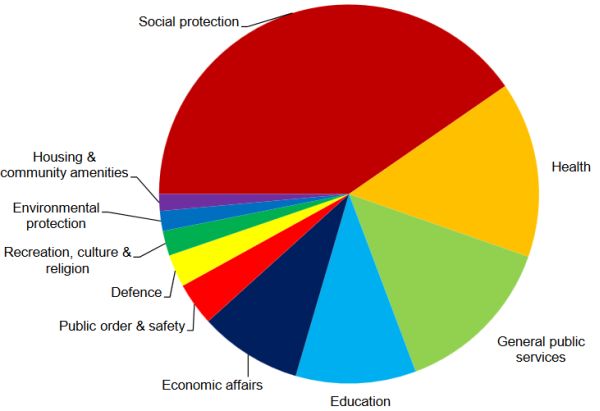
All rights reserved.
You may not copy, reproduce, republish, or otherwise use www.baltic-course.com content
in any way except for your own personal, non-commercial use.
Any other use of content requires the hyperlink to www.baltic-course.com.

Printed: 10.05.2024.
 PrintGeneral government expenditure in the EU showed great differences in 2014
PrintGeneral government expenditure in the EU showed great differences in 2014
The function ‘social protection’ was by far the most important in governments’ expenses, accounting for at least 20% of GDP in Finland, France, Denmark, Austria, Italy, Sweden, Greece and Slovakia.
The next most important areas were ‘health’ (7.2%), ‘general public services’ such as external affairs and public debt transactions (6.7%), ‘education’ (4.9%) and ‘economic affairs’ (4.2%). The functions ‘public order and safety’ (1.8%), ‘defence’ (1.3%), ‘recreation, culture and religion’ (1.0%), ‘environmental protection’ (0.8%) and ‘housing and community amenities’ (0.7%) had more limited weights.
However, these data at EU level mask significant differences between the EU states in the share of GDP devoted to each function of general government expenditure.
General government expenditure by function in the EU, 2014
Social protection
– about 20%; Health-7,2%; General public services – 6,7%; Education – 4,9%; Economic affairs – 4,2%; Public order
& safety – 1,8%; Defence – 1,3%; Recreation, culture & religion – 1%; Environmental
protection- 0,8% and Housing & community amenities – 0,7%.
 |
| General government expenditure by function in the EU, 2014 |
http://europa.eu/rapid/press-release_STAT-16-1023_en.htm?locale=en
Social protection
Share of social protection expenditure related to old age highest in Greece and lowest in Ireland Social protection represented the most important area of general government expenditure in 2014 in all EU member states except Cyprus, where a bank recapitalisation meant that other expenditure was higher.
The weight of government social protection expenditure varied across EU-28 states from 11.4% of GDP in Romania to 25.4% in Finland. Eight EU states – Finland, France, Denmark, Austria, Italy, Sweden, Greece and Slovakia – devoted at least 20% of GDP to social protection, while Romania and the three Baltic States each spent less than 12% of GDP on social protection.
Social protection expenditure are broken down into a number of detailed groups. The group ‘old age’, which includes pensions, made up the largest part of social protection expenditure in nearly all EU states. Government expenditure on ‘old age’ as a share of GDP was highest in 2014 in Greece (15.3%), Italy (14.0%), France (13.7%) and Austria (13.2%), and lowest in Ireland (3.7%). ‘Old age’ accounted for 10.3% of GDP in the EU.
Government expenditure on education and health varied significantly across EU-28 states With shares above 8% of GDP in 2014, Denmark (8.7%), Finland (8.3%), France (8.2%), Belgium and the Netherlands (both 8.1%) recorded the highest proportions devoted to health among the EU states.
Government expenditures
The highest shares of government expenditure on general public services in 2014 were observed in Cyprus (18.8% of GDP) and Hungary (10.2%).
Highest shares of government expenditure on education (2014) have been in Denmark (7.2% of GDP), Sweden (6.6%), Finland (6.4%), Belgium (6.3%) and Portugal (6.2%).
The highest shares of government expenditure on economic affairs were recorded in Hungary and Austria (both 7.4% of GDP).
In 2014, the highest share of expenditure on defence was observed in Greece (2.7% of GDP), on public order & safety in Bulgaria (2.8%), on environmental protection in Greece and Malta (both 1.6%), on housing & community amenities in Cyprus (2.2%) and on recreation, culture & religion in Estonia and Hungary (both 2.0%).